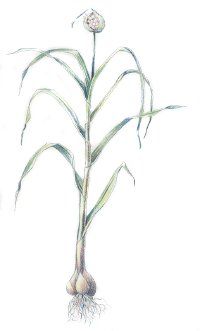Garlic's resume would read something like this: cholesterol lowerer, blood pressure reducer, blood sugar balancer, cancer combatant, fungus fighter, bronchitis soother, cold curer, wart remover, and immune system toner.
It also could mention garlic's potential career as an organic pesticide. With a resume like this, it's no wonder garlic is such a popular herbal remedy. This member of the lily family is one of the most extensively researched and widely used plants. Its actions are diverse and affect nearly every body tissue and system.
Advertisement
Lots of people include garlic in their daily diets for health reasons, while many others eat it because they love its pungent flavor. Many thousands of acres are devoted to cultivating garlic in the United States.
Uses for Garlic
As an antimicrobial, garlic seems to have a broad action. It displays antibiotic, antifungal, and antiviral properties and is reportedly effective against many flu viruses and herpes simplex (the virus responsible for cold sores). You may add garlic liberally to soups, salad dressing, and casseroles during the winter months to help prevent colds, or eat garlic at the first hint of a cold, cough, or flu. Garlic reduces congestion and may help people with bronchitis to expel mucus.
Garlic is used to treat many types of infections: Use capsules internally for recurrent vaginal yeast infections, use a garlic infusion topically as a soak for athlete's foot, or add garlic to an oil to treat middle ear infections.
This popular herb may improve immunity by stimulating some of the body's natural immune cells. Studies suggest that garlic may help prevent breast, bladder, skin, and stomach cancers. A study of women in Iowa suggests that women who eat garlic may lower their risk of colon cancer. Garlic appears particularly effective in inhibiting compounds formed by nitrates, which are preservatives used to cure meat that are thought to turn into cancer-causing compounds within the intestines.
Garlic lowers blood pressure by relaxing vein and artery walls. This action helps keep platelets from clumping together and improves blood flow, thereby reducing the risk of stroke. Garlic also decreases the levels of cholesterol and triglycerides, substances that increase the risk of cardiovascular diseases.
Garlic's cardiovascular protective properties have been demonstrated in a number of studies, including a four-year clinical trial on people over 50 years old, who already had symptoms of atherosclerosis. Those who consumed at least 900 mg per day of a standardized garlic supplement had significant reduction of arterial plaque formation.
Garlic contains a large number of unique sulfur-containing compounds, which are credited with many of this herb's medicinal actions. Did you ever wonder why garlic bulbs on your kitchen counter don't have a strong odor until you cut or crush them? That's because an enzyme in garlic promotes conversion of the chemical compound alliin to the odorous allicin. Allicin, in turn, produces other sulfur compounds: ajoene, allyl sulfides, and vinyldithiins. These sulfur compounds are potent antimicrobials and are thought to be the source of garlic's lipid-reducing and cancer-preventing effects.
The constituents in garlic also increase insulin levels in the body. The result is lower blood sugar. Thus, garlic makes an excellent addition to the diet of people with diabetes. It will not take the place of insulin, antidiabetes drugs, or a prudent diet, but garlic may help lower the need for additional insulin by reducing glycogen (stored sugar) release from the liver and by increasing the overall effectiveness of insulin.
In the next section, you will learn how to prepare garlic for herbal remedies and some of the potentially dangerous side effects.
To learn more about treating common medical conditions at home, try the following links:
- For an overview of all of our herbal remedies, go to the main Herbal Remedies page.
- To learn more about treating medical conditions at home, visit our main Home Remedies page.
- One of the best things you can do for your health and well being is to make sure you are getting enough of the vital nutrients your body needs. Visit our Vitamins page to learn more.
This information is solely for informational purposes. IT IS NOT INTENDED TO PROVIDE MEDICAL ADVICE. Neither the Editors of Consumer Guide (R), Publications International, Ltd., the author nor publisher take responsibility for any possible consequences from any treatment, procedure, exercise, dietary modification, action or application of medication which results from reading or following the information contained in this information. The publication of this information does not constitute the practice of medicine, and this information does not replace the advice of your physician or other health care provider. Before undertaking any course of treatment, the reader must seek the advice of their physician or other health care provider.Before engaging in any complementary medical technique, including the use of natural or herbal remedies, you should be aware that many of these techniques have not been evaluated in scientific studies. Use of these remedies in connection with over the counter or prescription medications can cause severe adverse reactions. Often, only limited information is available about their safety and effectiveness. Each state and each discipline has its own rules about whether practitioners are required to be professionally licensed. If you plan to visit a practitioner, it is recommended that you choose one who is licensed by a recognized national organization and who abides by the organization's standards. It is always best to speak with your primary health care provider before starting any new therapeutic technique.
Advertisement
